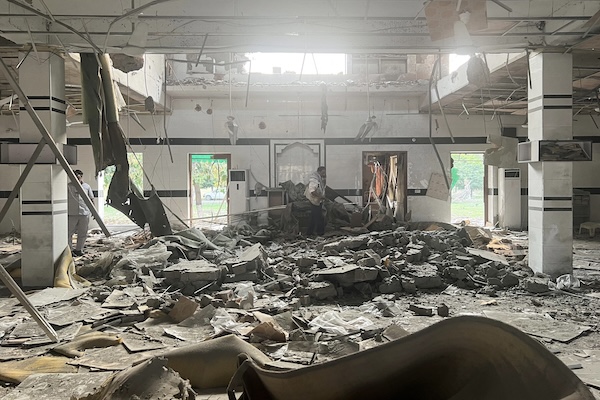 A man walks inside a mosque after it was hit by an Indian strike, in Muridke near Lahore, Pakistan 7 May 2025.;
Credit: Reuters/Gibran Peshimam/File Photo
A man walks inside a mosque after it was hit by an Indian strike, in Muridke near Lahore, Pakistan 7 May 2025.;
Credit: Reuters/Gibran Peshimam/File Photo
LAHORE/AMRITSAR (Reuters) - A blast was heard in Pakistan's Lahore city on Thursday 8 May 2025, broadcaster Geo TV and a Reuters witness said, a day after Indian strikes on multiple targets in the country and fears of a larger military conflict between the nuclear-armed neighbours.
There was no immediate word on the reason for the blast.
India hit "terrorist infrastructure" in Pakistan in the early hours of Wednesday 7 May 2025, two weeks after it accused the Islamic nation of involvement in an attack in Indian Kashmir in which 26 people - mostly Hindu tourists - were killed.
Islamabad had denied the accusation and vowed to retaliate to the missile strikes, also saying it shot down five Indian aircraft. The Indian embassy in Beijing termed reports of fighter jets being shot down as "misinformation".
Pakistan says at least 31 of its civilians were killed and about 50 wounded in the strikes and in cross-border shelling across the frontier in Kashmir that followed, while India says thirteen of its civilians died and 59 were wounded.
Ali Aftab, a resident of Lahore that is about 25 km from the Indian border, said he heard a "buzzing sound" followed by an explosion around 07:00. (04:00 CET).
"Immediately I rushed to the rooftop and saw smoke rising...the area was cordoned off by security forces soon after the incident," he said.
The Indian defence ministry did not immediately respond to a request for comment but an Indian defence official, who did not want to be named, said there were no Indian operations underway in Lahore.
The cross-border exchange of fire in Kashmir tapered off slightly overnight, Indian officials said.
Drills amid retaliation concerns
Blackout drills were conducted in India's border regions on Wednesday night, including in the northern border city of Amritsar which houses the Golden Temple revered by Sikhs.
Local media reported panic buying in some cities in the Indian state of Punjab which shares a border with Pakistan, as people hoarded essentials fearing a Pakistani retaliation to the Indian strikes.
In Pakistan, most cities returned to some normalcy and children went back to school. But in the border province of Pakistani Punjab, hospitals remained on high alert and civil defence authorities conducted exercises to deal with emergencies.
Pakistan's aviation authority also "temporarily suspended" flight operations at airports in Lahore, the southern port city of Karachi and the northeastern city of Sialkot until noon (09:00 CET). It did not give a reason for the suspension.
Although Pakistan's federal government has pledged to respond to India's strikes, Defence Minister Khawaja Muhammad Asif told The New York Times on Wednesday that Pakistan was ready to de-escalate.
With India saying it would "respond" if Pakistan "responds", global powers have urged a calming of tensions. US President Donald Trump said on Wednesday he hoped the countries could "work it out", adding he "will be there" if he can help.
US Secretary of State Marco Rubio separately discussed efforts to cool tempers between India and Pakistan with his Saudi Arabian counterpart in a Wednesday call, the State Department said.
The relationship between India and Pakistan has been fraught with tension since they gained independence from colonial Britain in 1947 and the countries have fought three wars, two of them over Kashmir.
The current escalation comes at a precarious time for Pakistan's $350 billion economy, which is still recovering from an economic crisis that brought it to the brink of defaulting on external debt obligations in 2023 before it secured funding from the International Monetary Fund (IMF).








